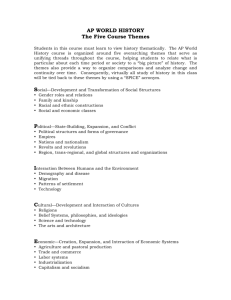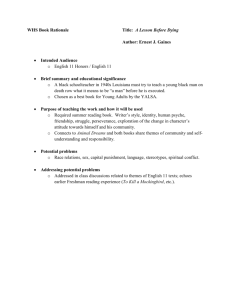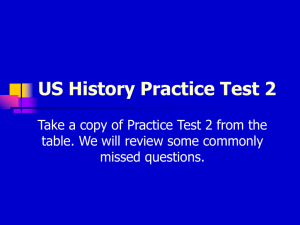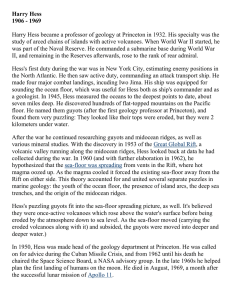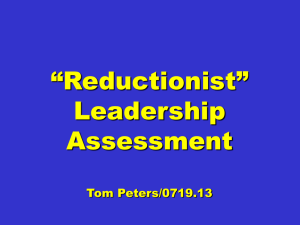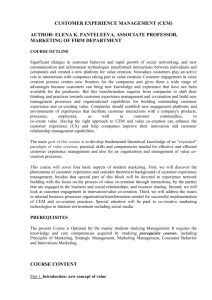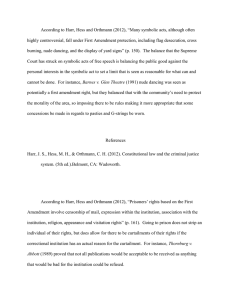Smart Growth
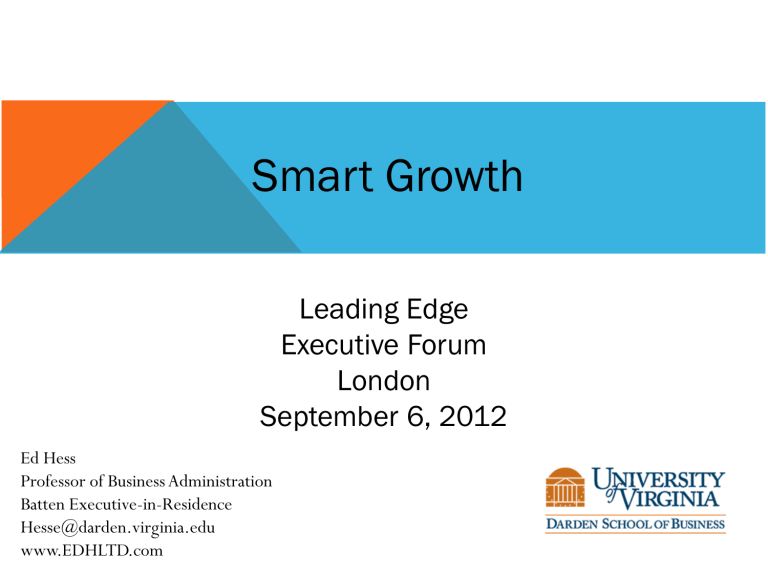
Smart Growth
Ed Hess
Professor of Business Administration
Batten Executive-in-Residence
Hesse@darden.virginia.edu
www.EDHLTD.com
Leading Edge
Executive Forum
London
September 6, 2012
GOALS
Discuss the science of business growth
Discuss the historical role of technology in creating growth
Explore the future role of technology in creating growth
Growth or Austerity is a FALSE choice: technology can enable both simulataneously
2
10 YEARS OF RESEARCH
3
MY THEMES
To be a high performance global business of the future one must have two world-class competencies:
Human Capital and Technology Capital
4
MY THEMES
Technology diminishes the competitive advantage of size and scale
Technology diminishes the power of the mass production business model
Technology enables the mass collaboration and mass customization business model
5
LEADING EDGE TECHNOLOGY BASED
ORGANIZATIONS
One can see these themes playing out today in the quant hedge funds like Renaissance Technologies, LLC
One can see these themes playing out today in military special ops and the intelligence community
Technology based “new growth” companies: Amazon, Google,
SalesForce.com
6
TRADITIONALLY
The fields of strategy, finance & economics have dominated growth thinking:
Sustainable competitive advantage
Unique products or services
Japanese production model or High value - add niche model
Growth is a linear reductionist production model
ROI, ROA, EVA, IRR
7
WHAT IS SMART GROWTH?
Research-based : What we really know about growth and how it occurs
What do the following disciplines say about growth ?
Neoclassical, new growth, industrial, ecological, and behavioral economics; strategy, finance, OB, OD, innovation, biology & complexity theory
8
7 SMART GROWTH FINDINGS
1) Growth is not a linear reductionist process
2) Biology & complexity theory model growth better than economics, finance, and business disciplines
3) Consistent growth is rare
4) Consistent organic growth is learning-based
5) Growth requires the Right Mindsets, System & Processes
6) High employee engagement & customer-centricity drive growth and innovation
7) Growth is behavioral- financial results come from behaviors
9
WHY IS CONSISTENT GROWTH SO HARD?
Individuals are hard-wired to be anti-growth:
Cognitive Blindness & Cognitive Dissonance
The reasons organizations exist are anti-thetical to growth:
To produce reliable, predictable, standardized results with low variance and low risks
10
DNA OF GROWTH
Most consistent high growth companies
Do not sell unique products or services
Do not have the best talent
Do not have visionary leaders
Are not the most innovative
Do not have the lowest costs
Do not have complex diversified strategies
11
HPOS: 30 YEARS OF RESEARCH
The “best” 8 studies:
1982, Peters &Waterman, The Search for Excellence
1994, Collins & Porras, Built to Last
1997, DeGeus, The Living Company
2000, O’Reilly & Pfeffer, Hidden Value
2001, Collins, Good to Great
2003, Joyce, et. al., What Really Works
2007, Hess, The Road to Organic Growth
2009, Simon, Hidden Champions
12
9 CONSISTENT FINDINGS
The “Not so secret sauce”:
1) Simple focused strategy- an “elevator pitch” business model
2) Structures that enable entrepreneurial behavior- “Small company soul in a large company body”
3) Higher purpose than shareholder value/profit- Money is not enough
4) Culture of relentless constant improvement- better, faster, cheaper
5) High employee engagement- an implied social contract – an accountable “family”
13
9 CONSISTENT FINDINGS
(CONT.)
6) Customer centricity – Inside the customer-
7) Humble passionate value-based leaders
8) Execution & service champions- excellence everyday every way by everyone enabled by technology- TECHNOLOGY LEADERS in Their industry
9) An Internal aligned self-reinforcing System that enables, motivates, and rewards desired behaviors
14
GROWTH IS
Growth is a dynamic iterative ziz-zag feedback-double loop learning process
Growth is a bottom-up & top-down process
Growth results from experimental learning
Growth requires constructive inquiry, critical thinking, diversity of views, a tolerance for failure, permission to speak freely
Growth requires flexibility, adaptability, speed, and organizational agility and ambidexterity
15
FORMULA FOR GROWTH
Growth = Mindsets + System + Processes
A Growth Mindset : Individuals & Organizationally
An internal enabling System linking in a consistent seamless selfreinforcing manner strategy, structure, culture, leadership behavior, HR policies & processes, measurements, & rewards to drive growth BEHAVIORS
16
GROWTH PROCESSES
Dynamic strategy making
Ideation
Opportunity exploration- what if
Customer co-creation
“Learning Launches”: Business’s scientific method
Growth Portfolio creation & management
17
THE COMMON GROWTH PROGRESSION*
Geographical expansion
Sell complementary products to existing customers
Expand to new customer segments
Add complementary services
Cost efficiencies
Technological productivity in supply chain, logistics, & manufacturing
Strategic acquisitions (small)
Move to solutions selling
* McKinsey and Hess Research Projects
18
TECHNOLOGY’S HISTORICAL ROLE IN CREATING GROWTH
1) Driving efficiencies & productivity
Manufacturing
Supply chain
JIT Inventory
Logistics & distribution
2) Providing financial & performance data to manage variances
19
TECHNOLOGY IS THE COMPETITIVE ADVANTAGE AT
Wal-Mart
UPS
Sysco
Paccar
ADP
Walgreen
Amazon
20
TECHNOLOGY HAS
Decreased response times
Decreased the importance of physical proximity
Increased the reach of every business
Decreased the power of physical & financial scale
Destroyed the false choice of size v. niche player
Democratized business globally
Given customers more power
Changed the velocity of product lifecycles
Made mass speedy customization possible
21
TECHNOLOGY NOW IS A GROWTH ENGINE
WHY?
Technology is moving from the “back of the house” to the “front of the house”:
Technology now makes scenario planning ( 40+ years old) and knowledge management ( 30 + years old) and organizational learning ( 40+ years old) realizable
22
TECHNOLOGY CAN DRIVE
Growth Experimentation
Evidence-based management
Analytics into dynamic strategy making, marketing, customer engagement, and human capital recruitment, training, and engagement
Technology can make employee and customer co-creation realizable on a broad scale
23
TECHNOLOGY ENABLES
1) A Learning Culture – A data-driven decision system at all levels
2) Early warning risks management systems
3) Mass collaboration with customers
4) Open innovation
5) Higher employee engagement
6) Destruction of business silos
7) Agility, adaptability, and makes speed a competitive differentiator
24
THE ROLE OF THE CIO
Prediction: In great growth companies of the future, the CIO will report directly to the
CEO.
Technology is a growth engine- both top-line & bottom-line
Ladies & Gentlemen: Start Your Engines !
25

